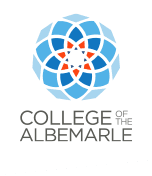Valerie Bobola epitomizes what students can achieve through the partnership between College of The Albemarle (COA) and the J.P. Knapp Early College High School in Currituck County.
Bobola graduated in May 2013 with her high school diploma and two degrees from COA: an Associate in Arts and an Associate in Science. The Knapp class valedictorian is now a student at Meredith College in Raleigh where she is pursuing two bachelor’s degrees — in chemistry and in math. Having earned 64 credits at COA, Bobola expects to graduate in just three years.
Bobola said she wouldn’t have been able to double major if she had not completed her general education requirements at COA and at no cost to her family. “I have not had any problem with credits transferring,” she said. “I haven’t paid COA anything.”
The early college high school initiative was developed by the North Carolina Department of Public Instruction, North Carolina New Schools, the North Carolina Community College System and the University of North Carolina. Launched in 2004, the program gets public funding to support the educational partnership between participating high schools and colleges. J.P. Knapp students don’t have to pay for classes or books while attending COA.
Since 2009, the partnership with COA has given Currituck High School students the opportunity to simultaneously earn their high school diplomas and their associate degrees in their chosen field of study. Students must apply and be accepted into the program.
“We recruit students who are underrepresented demographics on college campuses,” said Renee Dowdy, former principal of J.P. Knapp and now Director of Secondary Education for the Currituck school district. Typically, most of the students selected to participate in the program come from low socio-economic backgrounds, are first-generation college-goers or are not high performing students. “College may not be on their radar,” Dowdy said.
Five students from the first two graduating classes earned associate degrees. As interest in the program continues to grow, Dowdy expects those numbers to grow significantly.
“In 2013 we had the largest number of applicants,” Dowdy said. “Eighty-five freshmen applied in 2014.”
Students who choose not to pursue an associate degree can earn the Core 44 Diploma, which means they graduate with 44 credit hours of general education requirements completed on COA’s campus. Basically, Dowdy said, these students already have two years of their four-year degree studies finished.
“They’ve got a jumpstart on secondary education,” said Rita Jennings, COA’s Director of Secondary Education. “I know several students have gone on to four-year universities and have done well.”
These credit hours can be transferred to any of the 16 major universities in North Carolina. A number of other private North Carolina colleges also readily accept COA’s credit hours.
“It puts a pathway in front of our students to attain the Core 44 Diploma or an associate degree,” Dowdy said.
Valerie Bobola’s pathway to the private four-year school has been smooth, she said, thanks to her experience as a student on COA’s campus. Knowing how to navigate a campus, write research papers and communicate with her instructors are all skills she honed during her time at COA.
“It’s really given me something to expect,” Bobola said. “COA does a great job of portraying what college life will be like.”
With such an easy transition between the two campuses, Bobola has been able to focus on her career goals.
In 2013, she lost her father to kidney cancer. His twin sister also died of cancer — colon cancer — and Bobola’s paternal grandmother died of lung cancer.
The fact that each family member died of a different type of cancer indicates the cancer wasn’t hereditary but perhaps triggered by environmental contaminants.
The painful experience of losing her father has motivated her to study to become an environmental lawyer. “I would ideally work for the government as an environmental lawyer to prosecute those who waste dump and circumvent the laws that are there to protect the public,” she said.
Bobola was the first student to graduate with an associate degree from the J.P. Knapp-COA program in just four years. All other students have earned their associate degrees in five years.
Regardless of whether students in the program graduate with their associate degrees or Core 44 Diplomas in four years or five, Dowdy said, the program is a success. It’s tapping into a population that may not be considering college at all, so even if not all students in the program graduate with an associate degree, they are earning college credits and thinking about continuing their education beyond high school.
“I think the word is getting out about what a wonderful opportunity it is,” Jennings said. “I think the retention rate is extremely high.”


